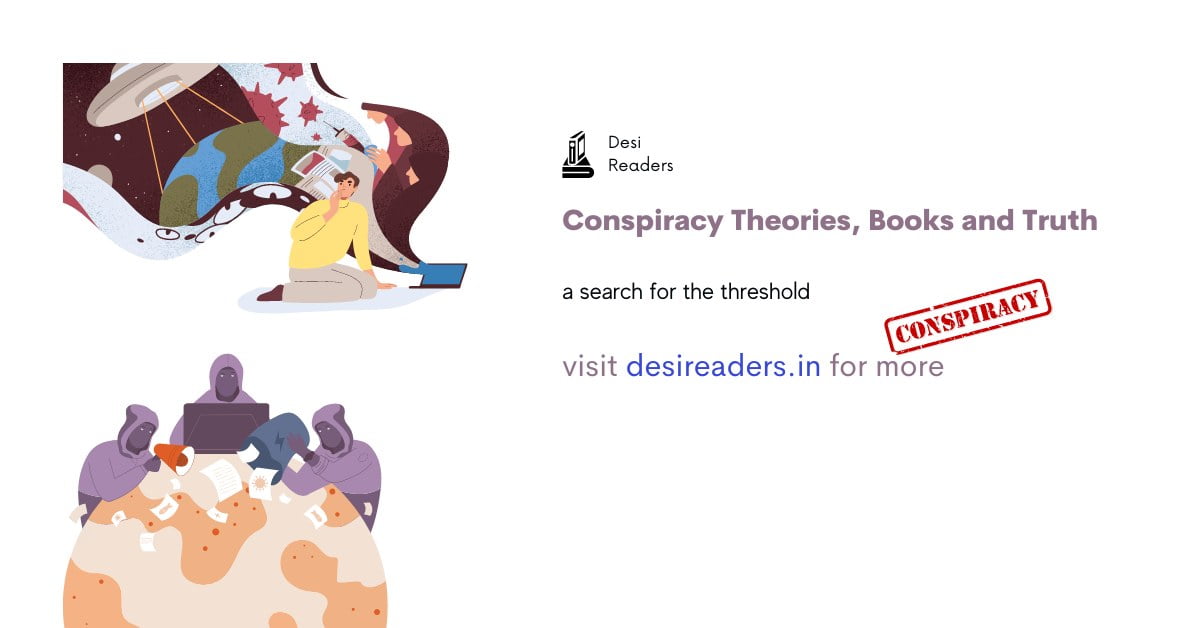The Fascination with Conspiracy Theories: An Exploration of Books That Delve into the Shadowy Corners of Truth
Conspiracy theories have a long and complex history, captivating the public imagination with their alternative explanations to widely accepted narratives. They often suggest that hidden forces or clandestine groups manipulate events behind the scenes. While a few of these theories have been vindicated over time, many remain speculative or have been discredited. Books centred on conspiracy theories delve into these enigmatic realms, providing readers with intrigue, scepticism, and sometimes unsettling truths.
This article delves into the origins of conspiracy theories and examines the motivations behind writing such books. Furthermore, it offers a detailed categorisation of conspiracy theory books based on their eventual outcomes, shedding light on the intriguing world of conspiracy theories and their impact on society.
The Origins of Conspiracy Theories
Conspiracy theories often arise in response to complex, unsettling, or inexplicable events. When faced with uncertainty, people may seek patterns or explanations that make sense of the chaos. This cognitive bias, known as “pattern recognition,” can lead to the belief that there are intentional and secretive forces behind events that are otherwise random or natural.
Historically, conspiracy theories have emerged during social upheaval, political instability, or technological change. For example, the assassination of President John F. Kennedy in 1963 sparked numerous conspiracy theories, mainly because the idea that a lone gunman could alter the course of history seemed too simplistic and inadequate for such a momentous event. Similarly, the rise of the internet and social media has amplified the spread of conspiracy theories, allowing them to reach wider audiences more quickly.

Why Authors Write Conspiracy Theory Books
Authors of conspiracy theory books are driven by various motivations, ranging from genuine belief in their theories to a desire to provoke thought or sell books. Understanding these motivations is crucial in understanding the appeal of such literature.
- Genuine Belief: Some authors are convinced that certain events’ official narratives are false or incomplete. They may feel morally obligated to expose what they perceive as the “truth.” For these writers, conspiracy theory books are a way to bring attention to what they see as overlooked or suppressed information.
- Provocation and Skepticism: Other authors may not fully subscribe to the theories they write about but use them to provoke critical thinking and scepticism. These books challenge readers to question authority and consider alternative explanations, even if they are improbable.
- Commercial Success: The allure of conspiracy theories is strong, and they often attract a large readership. Some authors write conspiracy theory books primarily to capitalise on this market, crafting sensationalist narratives that cater to readers’ fascination with the mysterious and the unknown.
- Psychological Exploration: For some, conspiracy theories offer a way to explore deeper psychological and societal issues. These authors may use conspiracy theories as a lens through which to examine fear, power dynamics, trust in institutions, and the nature of truth itself.
Conspiracy Theory Books That Turned Out to Be Accurate
Not all conspiracy theories are baseless. Once dismissed as mere speculation, some have later been substantiated by evidence. Below is a list of conspiracy theory books that eventually proved accurate, highlighting the importance of maintaining an open mind while exercising critical judgment.
1. “All the President’s Men” by Carl Bernstein and Bob Woodward
Summary: This book details the investigative reporting that led to the exposure of the Watergate scandal, a prominent political conspiracy involving the Nixon administration.
Accuracy: Many initially thought the idea that the President of the United States could be involved in such a scandal seemed far-fetched. However, the book’s claims were eventually substantiated, leading to Nixon’s resignation and confirming the existence of a high-level political conspiracy.
2. “The Pentagon Papers” by Neil Sheehan
Summary: The book is based on the Pentagon Papers, a secret government study of U.S. involvement in Vietnam, leaked by Daniel Ellsberg. It revealed that the U.S. government had systematically lied to the public and Congress about the Vietnam War.
Accuracy: The publication of the Pentagon Papers confirmed the conspiracy to deceive the public about the true nature of the Vietnam War, leading to a significant shift in public opinion and government policy.
3. “Silent Spring” by Rachel Carson
Summary: Although not a conspiracy book in the traditional sense, “Silent Spring” exposed the widespread use of harmful pesticides, particularly DDT, and the deliberate cover-up of their dangers by chemical companies and government agencies.
Accuracy: Carson’s work initially met with scepticism and strong opposition from the chemical industry. Eventually, it led to banning DDT and establishing the Environmental Protection Agency (EPA), which confirmed the book’s warnings.
4. “The Franklin Cover-up” by John DeCamp
Summary: This book investigates the Franklin child prostitution ring allegations, suggesting that a high-level conspiracy involving politicians and business leaders was responsible for covering up widespread abuse.
Accuracy: Although many aspects of the Franklin case remain controversial and disputed, subsequent investigations and testimonies have validated some of the book’s claims, lending credibility to the idea that influential individuals were involved in a cover-up.
5. “The Best Democracy Money Can Buy” by Greg Palast
Summary: Palast’s investigative journalism exposed election irregularities and voter suppression tactics in the 2000 U.S. presidential election.
Accuracy: The book’s claims of election tampering were substantiated by later investigations, and voter suppression continues to be a significant concern in U.S. politics.
6. Lies My Gov’t Told Me by Dr. Robert Malone
Summary: The book explores the misinformation and mismanagement surrounding the COVID-19 pandemic, mainly focusing on governmental and institutional responses. Dr. Malone, a key figure in mRNA vaccine technology, critically examines how public health policies were manipulated, leading to widespread mistrust. He delves into issues like censorship, data manipulation, and the politicization of science, arguing that these actions have had severe consequences for public health and democracy. The book has been praised for its timely and accurate analysis, providing insights into the failures of global pandemic responses.
Accuracy: The book turned out to be true! The governments, especially in the United States, did make a mess of the entire COVID-19 episode!
Conspiracy Theory Books That Remained Mere Speculations
While some conspiracy theory books have been vindicated over time, others have failed to stand up to scrutiny. These books remain speculative, often based on insufficient or misinterpreted evidence. Below is a list of conspiracy theory books that, despite their popularity, have yet to be validated by credible evidence.
1. “The Holy Blood and the Holy Grail” by Michael Baigent, Richard Leigh, and Henry Lincoln
Summary: This book posits that Jesus Christ married Mary Magdalene, had children, and their descendants live today, protected by a secret society.
Speculation: Despite its influence and inspiration for works like “The Da Vinci Code,” the claims made in this book have not been supported by historical or archaeological evidence and remain in the realm of speculation.
2. “Behold a Pale Horse” by William Cooper
Summary: This book is a collection of various conspiracy theories, including the idea that the U.S. government conspires with extraterrestrial beings.
Speculation: Cooper’s book has been widely criticised for its lack of credible evidence, and many of its claims, such as those involving aliens, are considered fringe theories without scientific backing.
3. “The Protocols of the Elders of Zion”
Summary: This notorious book claims to document a secret Jewish plan for global domination.
Speculation: “The Protocols” has been thoroughly debunked as an anti-Semitic hoax, yet it continues to be cited by conspiracy theorists and extremist groups, illustrating the dangerous persistence of false conspiracy theories.
4. “Communion” by Whitley Strieber
Summary: Strieber’s book details his supposed encounters with extraterrestrial beings, sparking widespread interest in alien abduction theories.
Speculation: While “Communion” has captivated readers, the claims of alien encounters remain unverified, and the book is regarded mainly as a work of speculative fiction rather than a credible account.
5. “None Dare Call It Conspiracy” by Gary Allen
Summary: Allen’s book argues that a secret cabal of global elites is orchestrating world events to establish a New World Order.
Speculation: The book’s claims have not been substantiated by credible evidence, and “it remains a cornerstone of far-right conspiracy theories that mainstream historians and political analysts often dismiss”. However, recent events somehow lead to a different truth. There is something in the air, and people can see it, too. With WEF and WHO crawling all over the world with their sham agendas, one can witness the orchestration of a new world order. So, those analysts and political experts may have to re-examine the book with a new and unbiased interpretation. It is no longer a far-right conspiracy. And certainly much more credible, and the ultra left’s ‘democracy is in danger’ and ‘they will change the constitution’ rag.
The Psychology Behind Conspiracy Theories
Understanding why conspiracy theories are so appealing requires delving into their psychology. Conspiracy theories often provide simple explanations for complex events, reducing ambiguity and offering a sense of control. This can be exceptionally comforting in times of crisis or uncertainty.
- Cognitive Biases: Humans tend to see patterns where none exist, a cognitive bias known as “apophenia.” This can lead people to connect unrelated events and perceive them as part of a larger conspiracy.
- Fear and Anxiety: Conspiracy theories often gain traction during social upheaval, economic instability, or political uncertainty. They can provide a sense of order and predictability in a chaotic and uncontrollable world.
- Distrust in Authority: A significant factor in the popularity of conspiracy theories is the erosion of trust in traditional institutions, such as governments, the media, and scientific bodies. When people feel alienated or disillusioned with these institutions, they may turn to alternative explanations that challenge the official narrative.
- Ingroup/Outgroup Dynamics: Conspiracy theories often appeal to a sense of ingroup superiority. Believers may feel they possess special knowledge or insight that others do not, reinforcing a sense of belonging to an enlightened group and distinguishing them from the “uninformed” masses.
- Social Media and Echo Chambers: The rise of social media has created environments where conspiracy theories can thrive. Algorithms that prioritise sensational content and echo chambers that reinforce preexisting beliefs can lead to the rapid spread and entrenchment of conspiracy theories.
Conclusion
Books on conspiracy theories are as varied as the theories, ranging from meticulously researched exposés to wild speculations. While some conspiracy theories have been validated by history, many remain speculative or outright debunked. The motivations behind writing these books are equally diverse, encompassing genuine belief, provocation, commercial success, and psychological exploration.
Ultimately, the appeal of conspiracy theory books lies in their ability to tap into fundamental aspects of human psychology: the desire for simple explanations, the need for control, and the distrust of authority. Whether accurate or speculative, these books provide a window into society’s fears, anxieties, and hopes.
For readers, the challenge lies in distinguishing between theories that deserve serious consideration and those that should be approached sceptically. Maintaining a critical mindset is more important than ever in a world where the line between fact and fiction is increasingly blurred.
By Alka for Desi Readers
